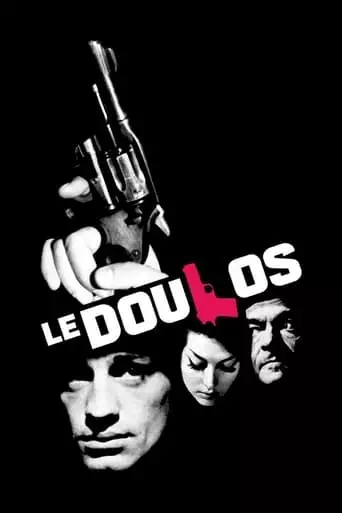Enigmatic gangster Silien may or may not be responsible for informing on Faugel, who was just released from prison and is already involved in what should be a simple heist. By the end of this brutal, twisting, and multilayered policier, who will be left to trust?
Le Doulos is a French crime thriller directed by Jean-Pierre Melville, released in 1962. The title translates to The Finger Man, referring to a slang term for an informant. The film delves into the intricate world of crime, loyalty, and betrayal, encapsulating the essence of film noir.
The narrative centers on Maurice Faugel (Serge Reggiani), a recently released convict seeking vengeance against his former associate, Gilbert Varnove (René Lefèvre), who betrayed him. Maurice’s quest for retribution leads him to cross paths with Silien (Jean-Paul Belmondo), a safecracker with a dubious reputation. As the story unfolds, themes of trust and deception emerge, with characters entangled in a web of lies and ulterior motives.
Main Themes in Le Doulos
- Betrayal and Loyalty
The film explores the fragile nature of trust within the criminal underworld. Maurice’s pursuit of vengeance against Gilbert highlights the devastating impact of betrayal among close associates. This theme underscores the precariousness of alliances in a world governed by self-interest.
- Identity and Deception
Characters in Le Doulos often conceal their true intentions, leading to a complex interplay of identities. The film’s title, meaning the finger man, refers to a hat worn by informants, symbolizing the dual lives led by its characters. This theme delves into the masks individuals wear to navigate their environments.
- Morality and Honor
Despite their criminal activities, characters like Silien adhere to a personal code of honor. This juxtaposition of criminality and morality adds depth to the narrative, prompting viewers to question the nature of honor and integrity within the context of crime.
- Fate and Consequence
The film examines the inevitability of fate and the consequences of one’s actions. Decisions made by characters lead to a series of events that spiral beyond their control, illustrating the deterministic elements of their lives.
Impact of Le Doulos
Le Doulos significantly influenced the crime genre, particularly the French noir movement. Its stylistic choices and narrative complexity have inspired numerous filmmakers, including Quentin Tarantino, who cited the screenplay as a major influence on his debut film, Reservoir Dogs. The film’s exploration of moral ambiguity and its portrayal of the criminal underworld have left a lasting imprint on cinema.
7 Reasons to Watch Le Doulos
- Masterful Direction by Jean-Pierre Melville
Melville’s direction is a testament to his expertise in the crime genre. His meticulous attention to detail and atmospheric storytelling create a compelling narrative that keeps viewers engaged from start to finish.
- Complex and Engaging Plot
The film’s intricate storyline, filled with twists and turns, challenges viewers to pay close attention to every detail. This complexity enhances the viewing experience, offering a rewarding narrative for those who appreciate layered storytelling.
- Strong Performances by the Cast
The ensemble cast delivers exceptional performances, bringing depth and authenticity to their characters. Jean-Paul Belmondo’s portrayal of Silien and Serge Reggiani’s depiction of Maurice are particularly noteworthy, showcasing their range and commitment to their roles.
- Influential Cinematic Style
Le Doulos is a quintessential example of French noir, with its moody cinematography, use of shadows, and atmospheric settings. These stylistic elements have influenced countless films and are a visual treat for cinephiles.
- Exploration of Timeless Themes
The film delves into universal themes such as betrayal, loyalty, and morality, offering a profound commentary on human nature. These themes resonate across cultures and eras, making the film’s message enduring and impactful.
- Cultural and Historical Significance
As a product of early 1960s French cinema, Le Doulos provides insight into the cultural and social dynamics of the time. Its portrayal of Parisian life and the criminal underworld offers a window into the era’s societal issues and cinematic trends.
- Critical Acclaim and Legacy
The film has received critical acclaim for its storytelling, direction, and performances. Its legacy continues to be celebrated, with retrospectives and analyses highlighting its importance in the crime genre. Watching Le Doulos allows viewers to experience a piece of cinematic history that has stood the test of time.
How Will You Feel After Watching Le Doulos (1962)?
After viewing Le Doulos, you will likely experience a sense of admiration for its intricate storytelling and atmospheric direction. The film’s exploration of complex themes such as betrayal, loyalty, and morality will provoke deep reflection on human nature and the choices individuals make. The strong performances by the cast, particularly Jean-Paul Belmondo and Serge Reggiani, will leave a lasting impression, showcasing the depth and authenticity they bring to their roles.
The film’s stylistic elements, including its moody cinematography and use of shadows, will immerse you in the noir aesthetic, evoking a sense of nostalgia for classic crime cinema. The intricate plot, filled with twists and turns, will keep you engaged, prompting you to reconsider earlier scenes and dialogue in light of the film’s conclusion.
Overall, Le Doulos offers a thought-provoking and visually captivating experience that will resonate with you long after the credits roll. Its exploration of timeless themes and its influence on the crime genre make it a film worth watching and reflecting upon.

